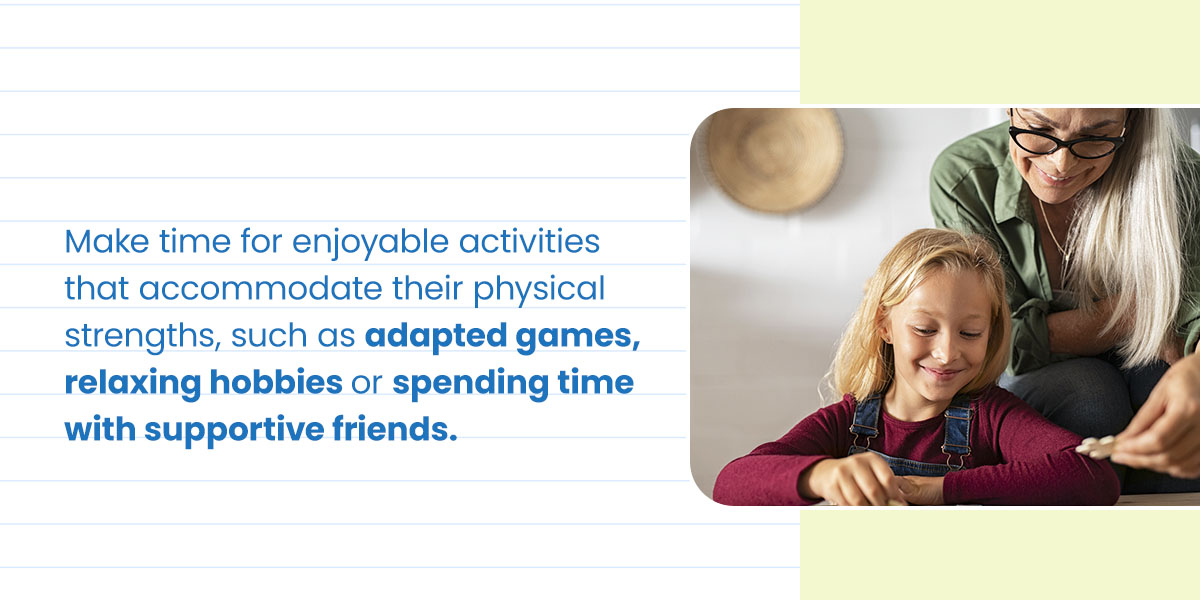Table of Contents
How to Cope and Thrive While Having a Chronic Illness: A Parent’s Guide
Parenting a child or teen with a chronic illness involves navigating the emotional challenges that come along with it. It’s understandable and natural to feel overwhelmed, frustrated or even scared facing a long-term diagnosis alongside your child. However, with the right support and coping strategies, your child can live a full, rewarding, enjoyable life.
The Link Between Anxiety, Depression and Chronic Illness
Having a chronic illness may increase an individual’s chances of developing anxiety, depression or another mental health condition. Chronic illnesses may bring symptoms, treatments, appearance changes, activity limitations and uncertainty about the future. All these factors can cause fear, worry, insecurity and isolation. Your child’s condition may also cause poor sleep, brain changes and medication side effects, which can further impact their mental health.
Signs Your Child May Need Help Coping With Chronic Illness
These signs may indicate that your child needs additional support:
- They’re constantly seeking reassurance.
- They’re experiencing increased clinginess or separation anxiety.
- They’re taking steps backward developmentally.
- They’re noticeably withdrawing from social situations.
Seeking help is a sign of strength and courage — if you observe these signs, reach out to a therapist with experience helping children with chronic illnesses.
At-Home Coping Strategies
You can support your child’s mental well-being by experimenting with various strategies.
1. Encouraging Open and Honest Communication
Building a strong connection with your child will help them thrive physically and psychologically. Creating a supportive and understanding environment starts with encouraging your child to talk about their feelings and concerns. Focus on:
- Validation: Acknowledge their feelings, let your child know it’s OK to feel their emotions and explain that communicating feelings is healthy.
- Empathy: Reflect on childhood and teenage uncertainties and pressures to understand what they’re going through in context.
- Patience: Offer unwavering support as they navigate their challenges at their own pace and try out different coping strategies.
- Positive reinforcement: Focus on their strengths, celebrate their successes, offer praise, and encourage their talents and interests.
2. Trying Mindfulness Techniques
Mindfulness can help your child manage stress and make coping with chronic illness easier. Try guided meditations using kid-friendly apps or body scan meditations that help children focus on the present moment. Mindful exercise, such as gentle yoga or nature walks, can also help. Encourage your child to pay attention to their breath, body and surroundings.
3. Following Calming Breathing Exercises
Practice deep breathing together, focusing on how the air feels as it enters and leaves the body. Try out the 4-7-8 technique — inhale for four seconds, hold for seven and exhale slowly for eight, repeating this several times. Doing these exercises as a family helps anchor your child in the present, lower their stress levels and make them feel supported.
4. Managing Stress
Living with a lifelong condition is stressful in many ways, from nerves about procedures to worrying about family finances. Ongoing stress can trigger inflammation and weaken your child’s immune system. If you want to help your child manage their stress:
- Prioritize fun activities: Make time for enjoyable activities that accommodate their physical strengths, such as adapted games, relaxing hobbies or spending time with supportive friends.

- Create a predictable routine: Establish consistent routines for medication, rest and other aspects of managing their illness to provide stability and a sense of control.
- Encourage creative expression: Encourage your child to express their feelings through art, music or writing. Creative outlets can help process emotions and reduce stress.
- Advocate for their unique needs: Help reduce stress at school by discussing accommodations for your child, such as accessible seating, extra test time and access to a quiet place to rest.
5. Creating Healthy Habits for Overall Wellness
Your child’s mind and body are deeply connected. What they think and feel affects their physical health, and vice versa. Ensure your child gets a balanced diet, sufficient high-quality sleep and regular gentle exercise like yoga or tai chi. These habits can help children and teens cope with stress, manage their symptoms and improve their overall well-being.
6. Building Resilience and Perseverance
Resilience helps children bounce back from difficult experiences. Help them set achievable goals and break down tasks into more manageable, less intimidating steps to build their confidence and self-belief. Also, remind your child to be self-compassionate — suggest they keep a journal to reflect on their “wins” and things they’re grateful for.
7. Forging Strong, Supportive Social Connections
Help your child connect with uplifting people, including school friends, family and others who understand their condition. They can also join support groups and explore accessible social activities like online video gaming and child- or teen-friendly community forums. Social media and video calls can help your child stay connected to health care providers, family and friends even when they need lots of rest at home.
Evidence-Based Professional Therapies
While at-home coping strategies and perspective shifts can be incredibly helpful, children with chronic illnesses and the families supporting them often benefit from more specialized professional guidance. Therapeutic approaches offer you, your child and your family clarity, respite and support. They also help you build skills and forge family bonds necessary to navigate chronic illness’s many challenges together.
1. Cognitive Behavioral Therapy for Dealing With Chronic Illness
Cognitive behavioral therapy (CBT) is based on the connection between your child’s thoughts, feelings and behaviors. Children and teens learn how to protect their mental well-being by changing how they think and react to thoughts and feelings. They also learn to identify and challenge unhelpful thoughts, adapt to difficult situations and manage overwhelming emotions. CBT can also teach your child how to:
- Accept their treatment: CBT can help your child dispel false beliefs and address fears about their medical care, encouraging them to consistently follow their treatment plan.
- Resist spiraling or catastrophizing: Therapists challenge exaggerated, worst-case-scenario thinking, replacing negative thought patterns with more balanced and optimistic perspectives.
- Promote self-efficacy: The therapy helps children achieve their goals by celebrating small wins, building their belief in their ability to cope and focusing on their strengths.
- Identify values and goals: CBT can help your child connect with what’s truly important to them and set meaningful goals that give them a sense of purpose beyond their illness.
2. Play Therapy to Manage Anxiety in Children
In play therapy, a trained play therapist creates a safe and supportive environment where your child can explore their emotions, work through stress and anxiety, and process difficult experiences related to their illness. During play therapy, children can use toys, games and creative activities to express things they can’t verbalize directly.
3. Family Therapy for Improving Communication
Family therapy offers a structured and supportive space for your family to improve communication patterns and develop strategies for navigating challenges as a united front. Family therapy can offer:
- Improved communication: Each family member can express their feelings, needs and concerns in a safe and structured environment.
- Conflict resolution: Family therapy helps family members understand each other’s perspectives and resolve conflicts.
- Parental stress relief: With guidance and support, parents can better navigate caring for their children while maintaining their own well-being.
- Support for siblings: Siblings get a safe space to share, whether they’re feeling left out or worried about their sibling’s health.
Find Hope and Healing for Your Child at Courageous Kids Counseling
At Courageous Kids Counseling, we understand the unique challenges children, teens and their families face when dealing with chronic illness. Our experienced therapists offer CBT, family therapy, play therapy and other therapeutic solutions to help children and families build resilience and navigate chronic illness and mental health concerns.
Contact us today at 914-326-2803, or schedule a free consultation to learn more about how we can help your whole family thrive.



